
SPRINGING INTO LOVE

director
CHINESE MUSIC ENSEMBLE VICKI LU,
MONDAY, APRIL 7, 2025 at 7:30 p.m.
HODGSON CONCERT HALL



director
MONDAY, APRIL 7, 2025 at 7:30 p.m.
HODGSON CONCERT HALL
Monday, April 7, 2025 at 7:30 p.m.
Hodgson Concert Hall
UGA Performing Arts Center
Vicki Lu, director
PROGRAM
Huanqin 欢沁
Woman Flower 女人花
Onara 오나라
Jomyeong-gok 조명곡
UGA Chinese Music Ensemble
UGA Chinese Music Ensemble
UGA Chinese Music Ensemble
Haegeum: Seunghee Lee
Picking Tea Leaves and Chasing Butterfly 采茶蝴蝶
UGA Dizi Ensemble
Welcome Spring 迎春
Jasmine Flower 茉莉花
Oxidation
UGA Hulusi Ensemble
UGA Chinese Music Ensemble
Dance of the Golden Snake 金蛇狂舞
Washing Clothes Song 洗衣歌
Kangding Love Song 康定情歌
Yangqin: Chao Tian
UGA Chinese Music Ensemble
UGA Chinese Music Ensemble
UGA Chinese Music Ensemble
Ensemble Arrangments by Vicki Lu
欢沁 Huanqin
UGA Chinese Music Ensemble
“Huanqin” is originally a pipa piece, composed by pianist Lin Hai (born 1969) and published in his 2003 music album: “Images of Pipa.” It was most notably used as one of the soundtracks in the movie “Letter from an Unknown Woman.” Lin Hai is known for his signature fusion of Western and Eastern musical styles. Music critics have referred to him as “right-handed East, left-handed West.” That characteristic is evident in this piece which has a chromatic bass line originally orchestrated for left hand piano and low strings while the melody was set for Chinese instruments such as the pipa and dizi. In our arrangement, we have scored this opening and recurring chromatic line for the guzheng, yanqin and cello while the melody is first articulated by the erhu, dizi, and pipa and later developed in other ways.
UGA Chinese Music Ensemble
“Woman Flower”by Li Anxiu (lyrics) and Cheng Yaochuan (tune) was made famous by Hong Kong’s illustrious cantopop singer and actress (nicknamed“Madonna of Asia”), Anita Mui YimFong in her 1997 album titled: 梅艳芳 Anita 女人花 (Flower of the Woman). The song created quite a sensation in China, ultimately becoming the theme song of the Chinese TV series“Oriental Mother”(东方母亲). This in part is because of the lyrics in which the singer (a woman) is presented as both a flower and of her desires as having a flower in her heart. This double positioning and comparison with a flower speaks to both hope/dreams and anxiety, beauty/desirability/love in time, but also fleeting so it should be embraced, otherwise there will be regret. The song continues to have a lasting impact on audiences worldwide through museum exhibitions at the Hong Kong Heritage Museum and a 2021 biographical film titled“Mui, about her life and career. In tonight’s performance, after an introduction by the guzheng, the melody will be presented on the erhu which is known to mimic the human voice and deep emotions with expressive slides, vibrato and other techniques that surely capture the ethos of both angst and strength evoked in the lyrics of the song.
UGA Chinese Music Ensemble
“Onara”is the theme song for the popular Korean drama Dae Jang Geum (大长今), Jewel in the Palace). It narrates the true story of Jang Geum, Korea’s first female physician. Since its debut in 2003, Dae Jang Geum has aired in over 90 countries, including China, Japan, the United States as well as in many other countries in Europe and the Middle East. Though Onara’s lyrics are written in Proto-Koreanic (Old Korean), a language that is not widely understood today, the song’s international popularity highlights how music transcends linguistic barriers, introducing global audiences to the richness of traditional Korean culture. The inclusion of this piece in our program underscores and is an acknowledgement of the historical and current musical interconnections of Korea with China.
“Onara”has been adapted for this concert for Chinese instruments, cello, and percussion. A prominent solo in the middle of the piece, usually performed on the haegeum, is reimagined on the erhu by Spring Yang. Although both instruments are bowed, their tone colors, techniques, and expressive styles differ significantly.“Onara”is also a prelude to the performance that follows by Dr. Lee on the haegeum, a Korean two stringed fiddle that is a‘cousin’to the Chinese Erhu.
조명곡 Jomyeong-gok
Haegeum: Seunghee Lee
“Jomyeonggok”brings to life the delicate sounds of birds in flight, perching, and singing. It was composed in 1985 by Korean musician Kim Young-jae, known for expanding haegeum repertoire by incorporating Western musical elements. This piece, first featured on his album Haegeum Works Vol. One has been performed by well known contemporary haegeum players, such as Yang Seung-hye at the National New Traditional Music Presentation in 2021. The haegeum’s versatile tones, ranging from light, fluttering notes to deeper, resonant sounds, mirror the wide range of bird call and movements. Jomyeong-gok not only captures the beauty of nature but also creates an atmosphere where the listener can imagine the vivid, lively scenes of birds in their natural habitat. The piece blends intricate instrumental techniques on the haegeum with the imagery of nature, allowing for a rich and dynamic listening experience. Dr. Lee is an internationally recognized haegeum performer and scholar with superior command of the instrument. She is renowned for her remarkable ability to interpret a wide array of repertoires beyond traditional Korean music to contemporary compositions.
迎春
UGA Hulusi Ensemble
“Welcome Spring”was composed in 1979 by He Weiqing, a member of the Chinese Professional Committee of Hulusi and Bawu. The organization focuses on the development and promotion of the hulusi (a free-reed instrument) and bawu (a double-reed instrument).“Welcome Spring” captures the arrival of spring, symbolizing new beginnings, good fortune, friendship, and blessings. Widely performed and notably featured on CCTV (Chinese Central Television), the piece displays the hulusi’s ability to evoke the joy and renewal represented in the spring season. The hulusi, most notably associated with Yunnan Province is cherished for its warm tone and. Tonight, we will perform“Welcome Spring”in two hulusi key types: G and D, in order to explore a broader pitch range. Using two key types at once is unusual in much of hulusi repertoire. This experiment also allows us to begin to explore compositional devices such as call and response/echo and other techniques that have broadened the advanced students’technical abilities on the instrument.
UGA Dizi Ensemble
Originally called“Picking Tea Lanterns,”“Picking Tea Leaves and Catching Butterflies”is a Fujian folk song and dance that got its name after a performance for local troops by the Fujian Provincial Cultural Bureau in 1952. The song gained further prominence when the Chinese government embraced it as a means to educate the public on its policies regarding labor and working traditions. Its popularity soared as it became a cultural emblem symbolizing the diligence, resilience, and unity of the working class.“Picking Tea Leaves and Catching Butterflies”not only entertained but also served as a powerful tool for instilling pride in labor and fostering a deeper appreciation for the values of hard work, cooperation, and community spirit. These roles cemented its treasured status as one of China’s intangible cultural heritage. The ensemble premiered this piece at their 2024 spring concert. Unlike last year when the piece was performed by the full ensemble, this arrangement is scored for dizi.
茉莉花
UGA Chinese Music Ensemble
“Jasmine Flower”is a cherished Chinese folk song from the Jiangnan region, celebrated for its simple yet graceful melody. Its lyrics describe the beauty and fragrance of the jasmine flower, symbolizing purity, elegance, and the connection between nature and human emotion. The song holds cultural significance as it embodies the values of Chinese art and aesthetics, and has become a symbol of national identity. While the core theme remains the same,“Jasmine Flower” has many versions and variants, with differences in both lyrics and melody. These variations reflect the song’s adaptability as it has been passed down through generations and performed in diverse regional styles. The song has transcended its folk origins, gaining international recognition and been widely adapted by different music traditions including Western classical arrangements, jazz interpretations and pop recordings by artists like Teresa Teng. Its inclusion in films and operas has also helped introduce the piece to global audiences. Its timeless appeal continues to captivate audiences around the world, making it an essential piece in representing Chinese culture globally. The most widely performed lyrics are:
“Beautiful jasmine flower, 好一朵美丽的茉莉花 Beautiful jasmine flower, 好一朵美丽的茉莉花
Sweet-smelling, beautiful, stems full of buds, 芬芳美丽满枝桠
Fragrant and white, everyone praises. 又香又白人人夸
Let me pluck you down to give to someone. 让我来将你摘下, 送给别人家 Jasmine flower, jasmine flower.”茉莉花呀茉莉花
Tonight, the piece will be performed by our advanced students alongside professional musicians. Vicki Lu has fused together and arranged three different melodies to which the lyrics of“Jasmine Flower”are set.
Yangqin: Chao Tian
Chao Tian, one of our outstanding guest performers, will perform a solo improvisation titled “Oxidation.”She describes the piece as follows:
“In my music, Chinese melodies intersect with intercultural environments. They are not simply preserved or reproduced but undergo a process of‘oxidation’—an irreversible transformation shaped by time and context. Sound becomes a cultural catalyst, constantly evolving within contemporary narratives, reflecting both preservation and reinvention in real-time.”
UGA Chinese Music Ensemble
“Dance of the Golden Snake”is a 1934 composition by Nie Er (聂耳), a renowned Chinese composer known for his contributions to the Revolutionary music movement. His most famous piece,“March of the Volunteers,”became the national anthem of The People’s Republic of China in 1949. “Dance of the Golden Snake”moved past patriotic music and into Chinese-Western fusion styles. In Chinese culture, the snake represents wisdom, transformation, flexibility often associated with festivals and celebrations.
The piece incorporates elements from the Jiangnan sizhu tune“Yang Ban Qu”into its lively melody. It blends Chinese musical elements with Western orchestral techniques. Often performed during Chinese New Year celebrations, the piece’s percussive beat and swirling melodies evoke the movement of a dancing snake.“Dance of the Golden Snake”remains a cornerstone of both Western and contemporary Chinese concert repertoires. Tonight, the ensemble will perform the original orchestral arrangement.
洗衣歌 (Xǐ Yī Gē) Washing Clothes Song
UGA Chinese Music Ensemble
“Washing Clothes Song,”written by Tibetan composer Luo Nianyi (1932-2023) in 1964, is well known for its upbeat and catchy melody. Written during the Cultural Revolution (1966-1976), it tells the story of Tibetan women tricking a soldier into letting them wash his laundry, with the soldier returning the favor by carrying their water baskets. The song was intended to promote national pride and solidarity, celebrating the harmonious relationship between Tibetan citizens and“Chinese”government soldiers. However, it was composed at the time when Tibetans were facing severe repression under the Chinese regime’s efforts to instill Communist ideals in an effort to unify the country. Despite its celebratory tone,“Washing Clothes Song”contrasts with the hardships faced by Tibetans during the Cultural Revolution. Today, the piece is widely performed nationally and in the Chinese diaspora at festivals and school events even though its history reflects the complexities of Tibet’s cultural struggle. Tonight, the ensemble will perform “Washing Clothes Song”in the original orchestral arrangement, capturing the energetic and rhythmic spirit of the work.
康定情歌
UGA Chinese Music Ensemble
“Kangding Love Song” a renowned folk tune from Sichuan, was adapted from a melody popular in the Kangding Region, an area known for its stunning mountainous landscapes and rich Tibetan cultural influences. Wu Wenji (1918-1966), a well-respected composer and music educator, was known for his efforts to modernize traditional Chinese music while preserving its cultural heritage. His adaptation of “Kangding Love Song” brought the tune into the spotlight, transforming it into a symbol of regional pride and romantic expression. The piece gained international fame when soprano Yu Yixuan (1909-2008), one of China’s most celebrated vocalists, performed it during her solo concerts in the 1940s. The song tells a romantic story of a young shepherd and a maiden who meet at midnight in the Kangding mountains to confess their love for each other. The call-and-response pattern in the music represents the lovers calling out to one another across the vast, beautiful mountains of the region.
Tonight’s performance begins with the dizi calling out from the mountains, setting the stage for the dialogue that unfolds throughout the piece. As the music progresses, a conversation emerges between the plucked and struck string instruments and the bowed and wind instruments. This interplay represents the lovers’ communication across the vast, beautiful mountains of Kangding. The echoing motif will be especially prominent towards the end, capturing the sense of distance and longing between the two voices/lovers.
Program Notes by Vicki Lu
STUDENT PERFORMERS
Vicki Lu Guzheng, Guzheng/Arranger
Spring Yang, Guest Erhu Instructor
Jean Kidula, Course Convener
MUSI48/6870 Asian Music Ensemble
Ashley Belcher (Hulusi, Dizi, Guzheng, Erhu)**
Daniel Boscan (Hulusi, Dizi, Guzheng, Erhu)
Sabrina Fung (Hulusi, Dizi, Guzheng, Erhu)
Sloan Garner (Hulusi, Dizi, Erhu, Guzheng)
Anna Hu (Hulusi, Dizi, Guzheng, Erhu)
Emma Hu (Hulusi, Dizi, Guzheng, Erhu)
Jianing Leng (Hulusi, Dizi, Guzheng, Erhu)
Xin Lin (Hulusi, Dizi, Guzheng, Erhu)
Anna Liu (Hulusi, Dizi, Guzheng, Erhu)
Ella Ma (Hulusi, Dizi, Guzheng, Erhu)
Gretta Maguire (Huluisi, Dizi, Guzheng, Erhu)
Amaan Patel (Hulusi, Dizi, Guzheng, Erhu)
Lavender Rafal (Hulusi, Dizi, Guzheng, Erhu)
Adam Starks (Erhu, Sheng)
Jodie Stone (Hulusi, Dizi, Guzheng, Erhu)
Judson Stricklin (Hulusi, Dizi, Guzheng)
Emmy Vong (Hulusi, Dizi, Guzheng, Erhu)
ATHENS COMMUNITY PERFORMERS
Ling Huang (Hulusi, Dizi, Guzheng)
John Tong (Erhu)
* HHSOM Alumni
* Assistance with program notes
VISITING GUEST PERFORMERS
Erhu
Yusheng Hsu
Yang Chun Lu
Ken Luu
Molly Schneider*
Longsheng Zhang
Jiaming Zou
Guzheng
Elena Lin
Sukie Lin
Dizi/Suona
Weicheng Mao
Feng Yuqi
Yangqin
Huang Rongfu
Chen Ying
Chao Tian
Pipa/Zhong Ruang
Jiejie Han
Mao Ling
Eileen Zhang
Percussion
Noah Samuelson
Cello
Ian Chen*
Aria Parks
Viktor Winfree
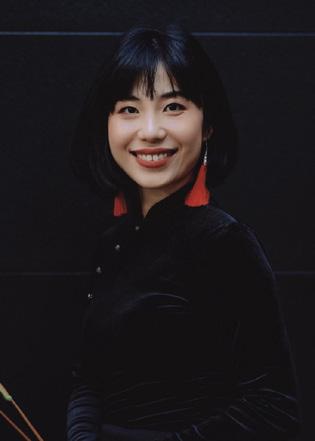
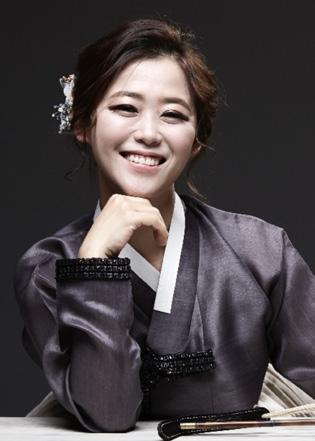

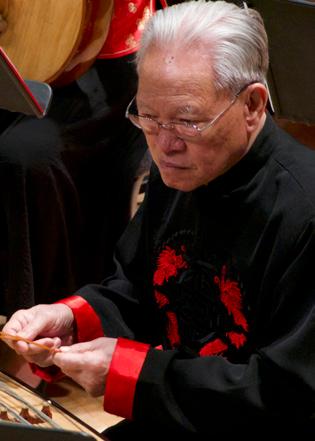
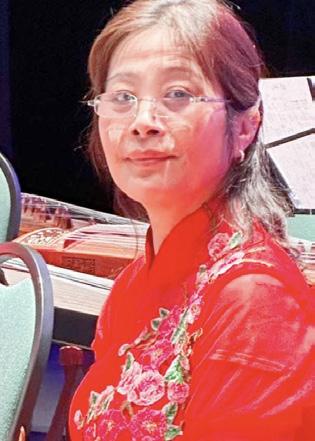
Chao Tian (田超) is an yanqin performer, improviser, sound designer, and advocate of Chinese traditional music. She explores the distinct sounds and techniques of the yangqin to create a multidimensional sensation of improvisation, breaking down barriers and working across creative genres.
Chao began learning the Yangqin, a Chinese Dulcimer, at the age of five, She was admitted to the Middle School affiliated with the China Conservatory of Music at age twelve. She received a BA in music performance and an MA in musicology at China Conservatory of Music in Beijing. Chao then became a music faculty member and the director of the Arts Education Center at Beijing Language and Culture University. She is currently pursuing a Ph.D. in Ethnomusicology at Boston University, focusing on musical improvisation, intercultural musical collaboration and cultural diplomacy. Chao was a former member of China’s famous 12 Girl Band. Chao has performed in over 30 different countries across the globe. In 2015 she was accepted into the prestigious Artist in Residence Program at Strathmore Music Center. Chao is also an alumna of Art Omi and a NextLOOK artist at the University of Maryland. She studies American hammered dulcimer with Karen Ashbrook with the support of the Folklife Apprenticeship program of the Maryland State Arts Council. Chao is a fellow of Musician Changemaker Accelerator Academy 2024. She also serves as a GRAMMY U mentor 2025.
Chao is involved in various projects. Unheard Sounds explores the transformation of artistic language in the intercultural collaboration of immigrant artists. Her musical projects include From China to Appalachia with two-time GRAMMY winners Cathy Fink and Marcy Marxer and Dong Xi (East and West) with world percussionist Tom Teasley. She is the band leader of Always Folk Ensemble and a band member of the awarded global jazz-fusion ensemble, Project Locrea.
Seunghee Lee (이승희) is renowned for her distinctive sound and mastery of the Korean haegeum. She is celebrated for her remarkable ability to interpret a wide array of repertoires, ranging from traditional Korean music to contemporary compositions originating within and beyond Korea’s borders. Dr. Lee’s exceptional abilities and sensitivity are evident in her powerful sound as well as in her command of an extensive spectrum of tone colors on the haegeum.
She has released notable albums such as The Singing Haegeum (2009) and The PAAN of Haegeum 2 (2019), establishing herself as an active soloist. Lee has also explored Pungnyu, traditional Joseon classical music, with albums like Haegeum Pungnyu Gajeunhoesang (2020) and Haegeum Pungnyu II (2022). She holds a Master’s degree from Korea National University of Arts and a Doctor of Musical Arts from Seoul National University. Currently, she is an Associate Professor in the Department of Korean Music at Yeungnam University in Gyeongsan, South Korea.
Yang Chun Lu (Spring Yang) is a distinguished alumna of the Sichuan Music Conservatory, where she pursued a major in Erhu performance and a minor in Guzheng. With a strong passion for music, she embarked on a professional career in music performance. Ms. Yang’s dedication to music education led her to establish the Spring Music School, a pioneering institution in Atlanta, Georgia, offering instruction in multiple Chinese musical instruments. As the founder of the School, Ms. Yang has played a pivotal role in promoting Chinese music and culture in the Atlanta community. Previously, she directed the Emory University Chinese Music Ensemble. Additionally, she organizes concerts regularly for her students. With over two decades of teaching experience, Spring Yang’s influence extends beyond her school and ensemble. She has conducted workshops and performances at prestigious institutions such as Georgia State University, Georgia Tech University, and Georgia Gwinnett College, spreading awareness and appreciation for Chinese music. Her performances at renowned venues like the High Museum of Arts, the State Botanical Gardens, and the Woodruff Arts Center have further solidified her reputation as a versatile and accomplished musician in diverse settings.
Huang Rong Fu is a highly venerated in the realm of Chinese music, serving as an educator, performer, and national-level musician affiliated with the prestigious Central Radio National Orchestra in China. His exceptional talent and dedication have earned him membership in the esteemed Chinese Musicians Association, a privilege reserved for a select few top musicians in the country. One of Huang Rong Fu’s notable contributions is his role as the co-inventor of the 401 yangqin system. This innovative system has become the standard instrument for yangqin players and the development of its repertoire in China and internationally, showcasing Huang Rong Fu’s influence and expertise in shaping the musical landscape. Currently, Huang Rong Fu is the principal yangqin player at the Spring Music School and Taoran Music Ensemble in Atlanta, Georgia. In this role, he continues to inspire and mentor aspiring musicians, sharing his wealth of knowledge and passion for music with the next generation of performers.
Chen Ying graduated in 1980 from the Zhejiang Academy of Fine Arts where she majored in yangqin and marimba. In 1995, Chen Ying showcased her talent on an international stage by participating in the inaugural International Jiangnan Sizhu Competition. Her exceptional skills earned her second place in the professional group category. The following year, Chen Ying’s career took a significant turn when she became part of China’s pioneering music documentary, “Jiangnan Sizhu.” As a yangqin performer featured in this groundbreaking production, she documented and promoted Chinese musical traditions to a global audience. Chen Ying’s musical journey has taken her to various international performances to share the rich cultural heritage of Chinese music. Her participation in these events has not only showcased her talent but has also contributed to cultural exchange and appreciation across borders.
The University of Georgia’s Chinese Music Ensemble was incepted in Spring 2022. The course MUSI 48/6870 is open to any UGA students regardless of major and expertise.
Students are introduced to playing techniques and repertoire of the Dizi, Hulusi, Erhu, and Guzheng, instruments that are classified in the ancient Chinese Silk and Bamboo category- Si-Zhu. The dizi is a wind instrument with six holes, the Hulusi is a gourdshaped wind instrument with seven holes, the Erhu is a two-stringed bowed lute and the Guzheng is a twenty-one-stringed zither. Students are required to learn three out of the four instruments during the semester. This semester, they all learned Hulusi and Dizi. Students were divided into two groups for different repertoire on the Erhu and the Guzheng. Some students expressed interest in the Xun (a clay ocarina), Sheng (a free-reed wind instrument), Suona (a double reed horn), and Matouqin (a Mongolian stringed instrument with a carved horse’s head).
These instruments are will be featured in some of the repertoire tonight.
In addition to UGA students, the ensemble includes members from the larger Athens community. We are further joined by professional performers and students from the Spring Music School in Atlanta, Georgia.
Special thank you to Dr. Bara (iterim director of HHSOM) for the support for new instruments (guzheng and erhu). Additional thank you to James Sewell for logistical organizations for our concerts!
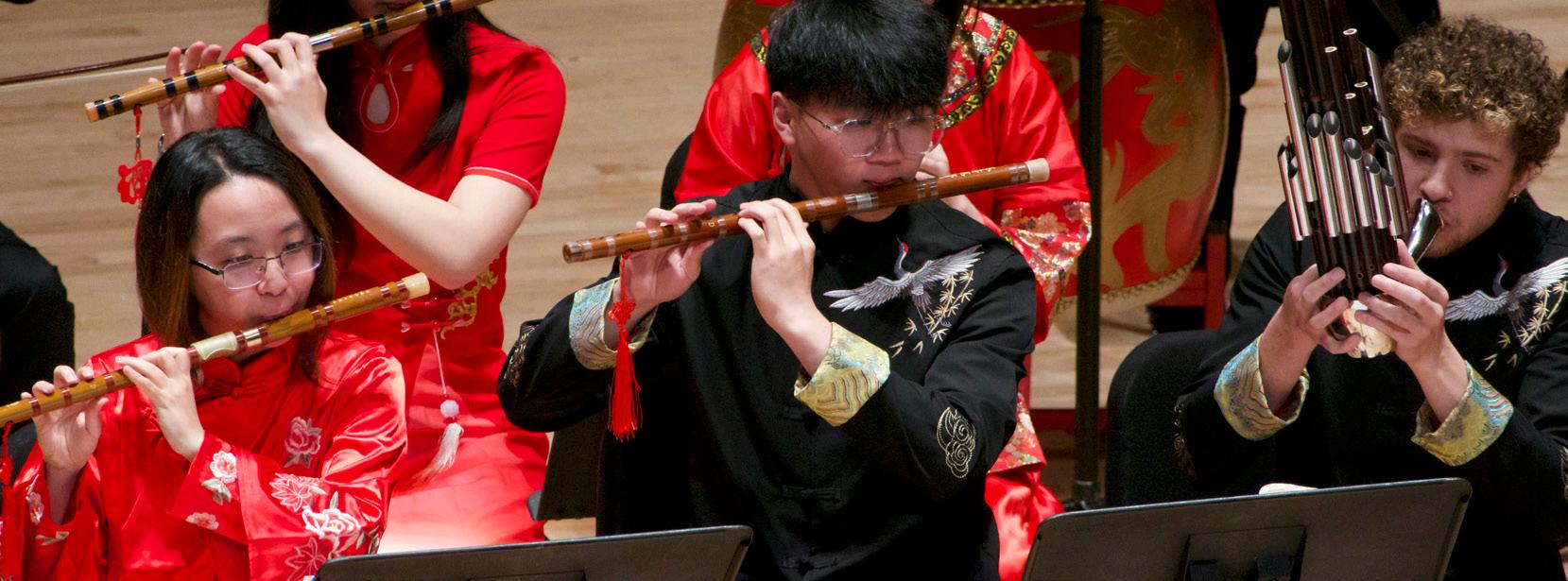
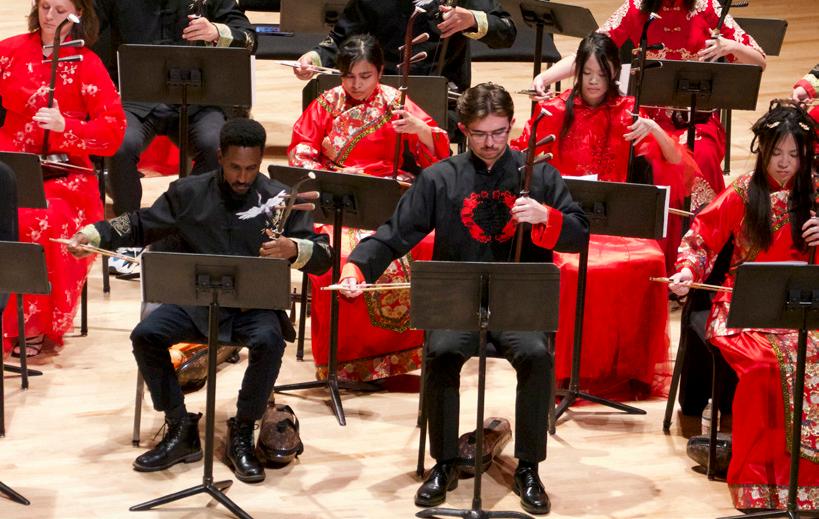
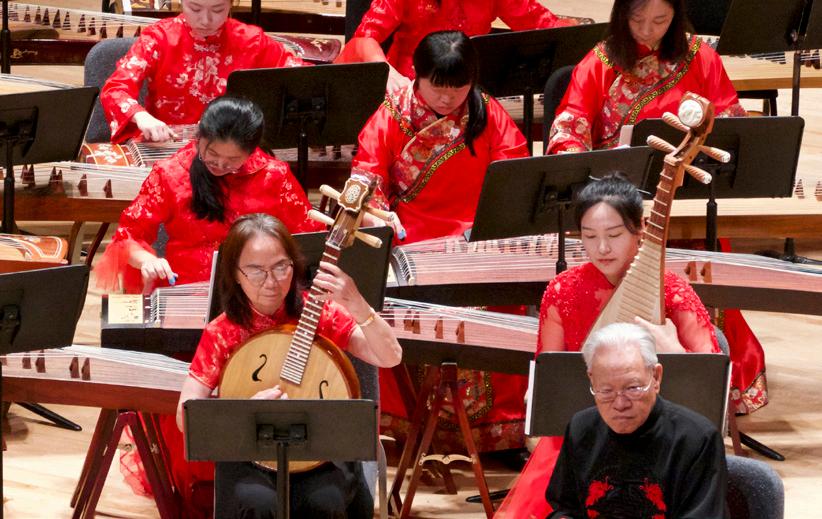

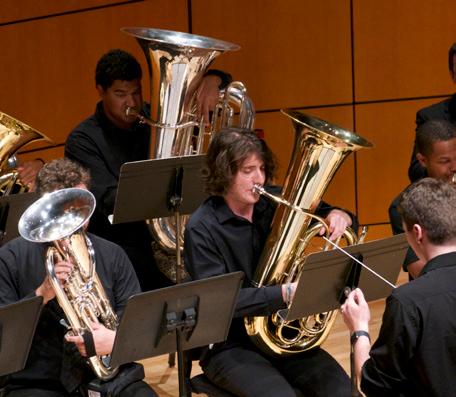
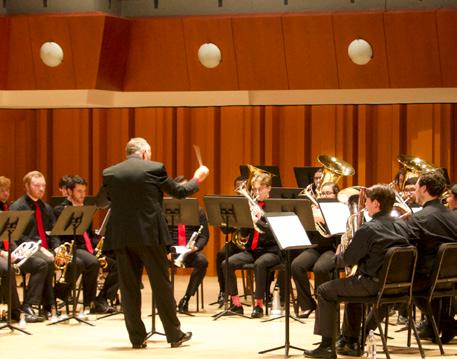
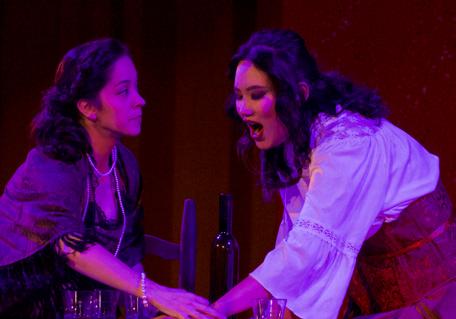
MON 4/14
5:30 p.m.
Ramsey Concert Hall FREE CONCERT
The UGA Tuba-Euphonium Ensemble is a performance opportunity for graduate and undergraduate low brass students to play challenging music for their instrument. The ensemble performs literature including serious original compositions for tuba ensemble, transcriptions of orchestral literature, and lighter arrangements.
MON 4/14
7:30 p.m.
Ramsey Concert Hall FREE CONCERT
The British Brass Band, under the baton of Bandmaster Philip Smith, has become an Athens fan favorite. The repertoire encompasses a wide variety of styles including excellent original works, marvelous transcriptions of orchestral works, as well as marches and other light pieces.
TUES 4/15
7:30 p.m.
Ramsey Concert Hall FREE CONCERT
UGA Opera Theatre presents “Opera in Bloom: Tales of Love and Longing.” Featuring graduate and undergraduate vocal students, this evening of scenes includes works by Mozart, Donizetti, Monteverdi, Gilbert & Sullivan, and more.
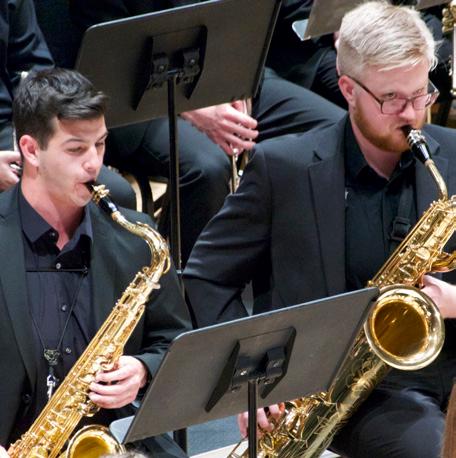
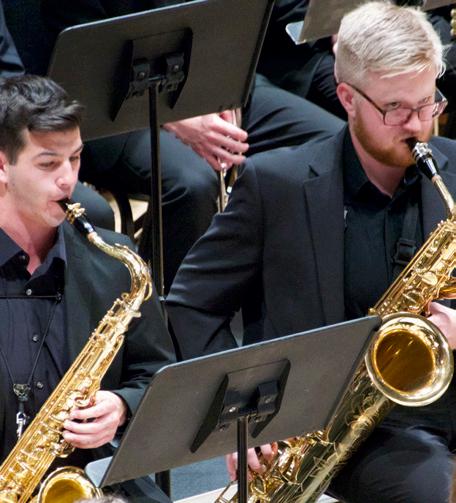
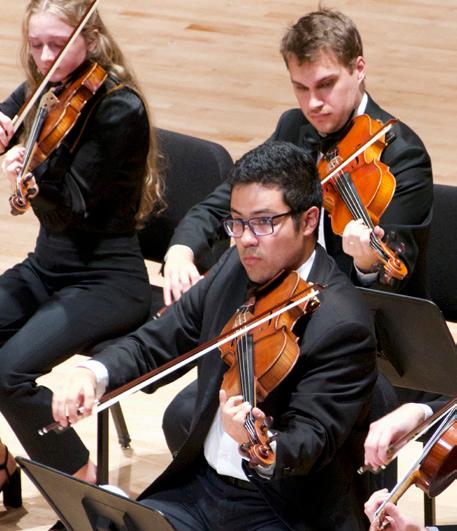
WED 4/16
7:30 p.m.
6:00 p.m.
Mental Health
Resource Fair
Hodgson Concert Hall FREE CONCERT
Performing Arts Center
7:00 p.m.
Concert
Hodgson Concert Hall FREE CONCERT
THURS 4/17
7:30 p.m.
Hodgson Concert Hall
$20 - Adult
$3 - Child/Student
The Wind Symphony performs the finest standard and new repertoire for wind band at several concerts each season. The Wind Symphony regularly features outstanding guest artists and performs collaborative concerts with Georgia high school bands.The Symphonic Band focuses on the classic band repertoire as well as exciting new music, and has recorded for C. Alan Publications.
Through music, we heal, connect, and inspire. This concert is a celebration of strength, resilience, and the power of mental well-being. With a powerful lineup featuring works by composers like Flagello, Douglas, Pilsner, McAllister, Balmages, Kevin Day, Kelijah Dunton, Wayne Lu, Frank Ticheli, and Mark Camphouse, this performance will take you on a journey of hope, self-expression, healing, and light.
ARCO Chamber Orchestra and the UGA Dance Ensemble, directed Levon Ambartsumian and Lisa Fusillo respectively, collaborate to create an evening highlighting the intricate relationship between music and dance. The program will feature music by Telemann, Tchaikovsky, Grieg, Piazzolla, Schnittke, and Khachaturian. Professor of flute Angela JonesReus will be a featured soloist. This stunning performance is not to be missed.
This concert is a Thursday Scholarship Series performance.